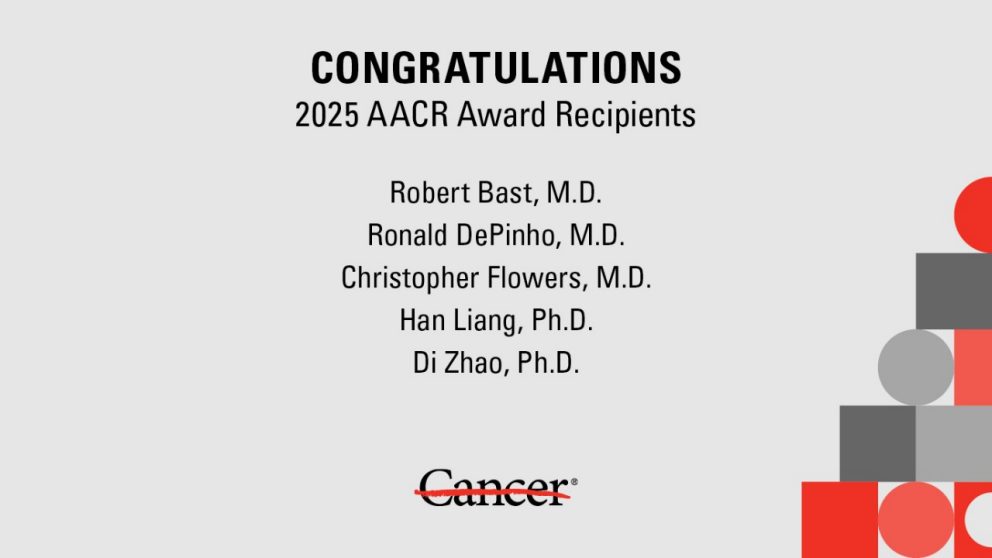Five scientists from The University of Texas MD Anderson Cancer Center will be recognized with Scientific Achievement Awards and honors at the American Association for Cancer Research (AACR) Annual Meeting 2025. These awards highlight significant achievements in translational research and oncology leadership from both early career and internationally renowned scientists and clinicians.
The honors include:
AACR-Daniel D. Von Hoff Award for Outstanding Contributions to Education & Training in Cancer Research: Robert Bast, M.D.
AACR-Princess Takamatsu Memorial Lectureship: Ronald DePinho, M.D.
AACR-Minorities in Cancer Research Jane Cooke Wright Lectureship: Christopher Flowers, M.D.
AACR-Award for Outstanding Achievement in Basic Cancer Research: Han Liang, Ph.D.
NextGen Star for the AACR Annual Meeting 2025: Di Zhao, Ph.D.
"Congratulations to our distinguished researchers who represent an extraordinary group of scientists committed to exceptional discovery, translational and clinical research," said Peter WT Pisters, M.D., president of MD Anderson. "We celebrate your contributions and look forward to our continued work driving transformative advances and creating tremendous impact for patients."
AACR-Daniel D. Von Hoff Award for Outstanding Contributions to Education & Training in Cancer Research
Robert Bast, M.D., professor of Experimental Therapeutics, is a pre-eminent pioneer and authority on cancer biomarkers and translational research. His research led to the discovery of CA-125 as a biomarker for ovarian cancer, contributing to the care of hundreds of thousands of women worldwide. This award recognizes Bast for impacting hundreds of young scholars through innovative programs of education and mentoring for physician-scientists, clinician-investigators, fellows, graduate students and research administrators. He serves as director of Translational Research Career Development, coordinating MD Anderson's physician-scientist and K12 clinician-investigator training programs. Of the 45 graduates of the physician-scientist program, 87% earned their first individual investigator grant or equivalent to launch their respective careers. Among the 33 graduates of the K12 clinician-investigator program, 13 have gone on to conduct practice changing clinical trials.
AACR-Princess Takamatsu Memorial Lectureship
Ronald DePinho, M.D., professor of Cancer Biology and Fellow of the AACR Academy, is recognized for his work to uncover the genetic and biological mechanisms governing cancer, particularly the role of telomere biology in cancer and aging. Utilizing innovative genetically engineered models, he elucidated the basis for the preponderance of epithelial cancers in the aged, resistance mechanisms enabling KRAS-independent cancer growth, and the role of telomeres in driving genomic instability and age-associated degenerative diseases. He demonstrated that aging is reversible. DePinho will present his award lecture April 27.
AACR-Minorities in Cancer Research Jane Cooke Wright Lectureship
Christopher Flowers, M.D., division head of Cancer Medicine and chair of Lymphoma/Myeloma, is recognized worldwide as a leader in lymphoma clinical and population science who has made seminal contributions to the field. Through his research, he has uncovered disparities in the presentation and outcomes for lymphoid cancers. Flowers also led cohort studies that enhanced the understanding of risk models and outcomes for lymphoma patient populations. In parallel, he has served as a mentor to many scientists among the next generation of cancer investigators. Flowers will present his award lecture April 28.
AACR-Award for Outstanding Achievement in Basic Cancer Research
Han Liang, Ph.D., professor of Bioinformatics and Computational Biology, is recognized for his significant contributions to advancing cancer genomics through pioneering pan-cancer analyses, contributing to personalized cancer therapies and the broader field of cancer bioinformatics and systems biology. He also developed widely utilized bioinformatics tools, such as The Cancer Proteome Atlas and TANRIC, an open-access resource for interactive exploration of long noncoding RNAs (lncRNAs) in cancer. Liang's work has uncovered critical roles of A-to-I RNA editing and systematically identified tumor-intrinsic and tumor-microenvironment vulnerabilities. Liang will present his award lecture April 28.
NextGen Star for the AACR Annual Meeting 2025
Di Zhao, Ph.D., assistant professor of Experimental Radiation Oncology, has garnered significant recognition for her contributions to the field of prostate cancer. Combining state-of-the-art genetically engineered laboratory model systems and single-cell multi-omics, her research successfully characterized several therapeutic targets and combinatorial strategies for advanced prostate cancer. Notably, Zhao has built long-term collaborations with translational scientists and genitourinary oncologists at MD Anderson and contributed to translating her basic research from bench to bedside. Zhao will present her work April 27.
"We are pleased to see AACR recognizing so many of our researchers, which is a testament to our institution's unique research ecosystem and commitment to groundbreaking science," said Giulio Draetta, M.D., Ph.D., chief scientific officer at MD Anderson. "The achievements of our honorees inspire us as we continue to pursue more breakthroughs in prevention, diagnosis, treatment and survivorship that improve patient outcomes."
In addition to these AACR honors, Timothy Yap, M.B.B.S., Ph.D., professor of Investigational Cancer Therapeutics, and vice president and clinical development head of Therapeutics Discovery, has been recognized with two recent appointments. He was named editor-in-chief of AACR's peer-reviewed journal, Clinical Cancer Research, and he was elected to the AACR Board of Directors. Yap has been an active member of the AACR since 2007, holding various leadership and advisory positions within the organization. Yap's research focuses on the first-in-human and combinatorial development of molecularly targeted agents and immunotherapies, and their acceleration through clinical studies using novel predictive and pharmacodynamic biomarkers.
More information on all MD Anderson AACR Annual Meeting content can be found at MDAnderson.org/AACR.







